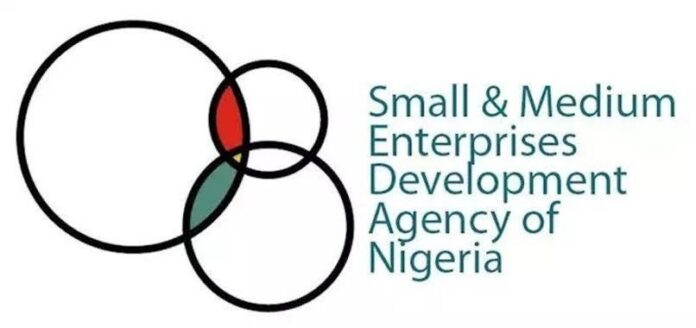The Small and Medium Enterprises Development Agency of Nigeria (SMEDAN) has signed a Memorandum of Agreement (MoA) with 212 enterprises for the implementation of One Local Government, One Product (OLOP) programme.
OLOP is SMEDAN’s flagship programme positioned to make significant contributions to the growth of the economy by mobilising micro businesses in 774 local government areas to translate natural resources into value added products.
Speaking at the signing of the Memorandum of Agreement on Thursday in Abuja with officials of the enterprises and Micro Finance Banks (MFBs), the Director-General of SMEDAN, Mr Olawale Fasanya said that the project was to assist SMEs grow their businesses.
Fasanya, who expressed worry that a major challenge hindering the growth of SMEs was the lack of access to loans, urged the MFBs to ensure timely disbursement of money to grow businesses.
The SMEDAN boss also tasked the beneficiaries of the programme to make judicious use of the opportunity to grow their businesses, create wealth, generate employment and contribute to the nation’s GDP.
He reiterated SMEDAN’s commitment to drive the OLOP project in identifying a single product in one local government area and assist SMEs operators in form of cooperatives, with financial, technical and marketing support.
According to Fasanya, this 6th edition of signing the Memorandum of Agreement with Micro Finance Banks and cooperative societies is ending the first circle of the OLOP programme.
“That means that the 774 Local Government Areas in Nigeria have been covered.
“212 Local Government Areas in the North Central are benefiting. They are in Benue, Kogi, Nasarawa, Niger, Plateau States and the Federal Capital Territory (FCT).
“This stream rounds off the first circle of 2022 OLOP programme,’’ Fasanya said.
While expressing SMEDAN’s desire to ensure that no progressive agro business was left out, he urged the beneficiaries and the MFBs to always comply with the objectives of the OLOP programme.
According to him, SMEDAN has resolved to have Micro, Small and Medium Enterprises (MSMEs) sector that is competitive.
Fasanya, however, emphasised the need for beneficiaries of the programme to always pay back the loans with a view to enabling other cooperative societies benefit from the scheme.
He vowed that SMEDAN would embark on forensic audit on how the programme fared, adding that cooperative societies that failed to pay back the loans would have their property sold.
Earlier, Hajia Sefia Banla, Director Agro Business in SMEDAN described OLOP as a two-year programme with beneficiaries having 70 per cent of the total amount received as loan and 30 per cent as grant.
She emphasised that SMEDAN would continue to render business development services, training and funding to build the capacity of MSMEs in Nigeria.
She also urged the beneficiaries to utilise the fund only for business purposes and tasked the banks to ensure timely disbursement of funds.
Banla also decried delay in loan repayment by some of the beneficiaries.
She urged the MFBs to ensure there was no unnecessary delay in disbursement of fund and that disbursements were made into the cooperate account of the cooperative societies.
She also tasked the MFBs to ensure that the cooperatives submit bankable business plans before disbursements were made.
Sharing his success story, Mr Valentine Anosike of Mac-Chiz Global, said that the ability of the company to repay the SMEDAN loan opened the way to enjoy better incentives from the agency.
According to him, the support from SMEDAN has increased the company from having five products to 11 registered products.




